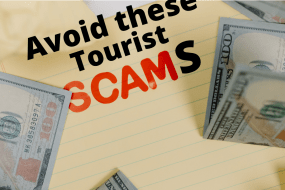
In the world of travel, having a knowledgeable and trustworthy tourist guide can greatly enhance your experience and ensure you make the most of your journey. However, it's important to be aware of the potential risks associated with tourist guide scams. These scams can range from overcharging for services to providing inaccurate information or even leading unsuspecting tourists into dangerous situations. In this article, we will delve into the world of tourist guide scams, shed light on common tactics used by scammers, and provide you with valuable tips to protect yourself and make informed decisions when hiring a tourist guide.
Understanding Tourist Guide Scams
Tourist guide scams are prevalent in many popular tourist destinations worldwide. Scammers often target unsuspecting travelers who are unfamiliar with the local culture and language. By posing as genuine tourist guides, they exploit the trust placed in them and manipulate tourists for their own financial gain. It is crucial to be aware of the various types of scams and the warning signs associated with them.
Common Types of Tourist Guide Scams
- Overcharging for Services: One of the most common scams involves tourist guides overcharging for their services. They may quote exorbitant prices or add hidden fees, taking advantage of tourists who are unaware of the standard rates.
- Misinformation and Inaccurate Facts: Scammers may provide false or misleading information about historical sites, cultural traditions, or local customs to make themselves appear more knowledgeable or to create a sense of urgency.
- Bait and Switch: Some fraudulent tourist guides may promise specific attractions or experiences during the tour but fail to deliver on those promises. They might take tourists to less popular or less desirable locations instead.
- Unlicensed Guides: Hiring an unlicensed guide puts you at risk of falling victim to scams. Legitimate tourist guides are required to obtain proper licensing, which ensures their expertise and adherence to professional standards.
- Unauthorized Souvenir Purchases: In certain scams, guides may take tourists to specific shops or vendors where they receive a commission for every sale made. These shops may offer overpriced or counterfeit products, leaving tourists with subpar souvenirs.
Identifying Warning Signs
To protect yourself from tourist guide scams, it's essential to be vigilant and watch for the following warning signs:
- Pressure to Make Quick Decisions: Scammers often create a sense of urgency, pressuring tourists to make immediate decisions without allowing them time to research or think things through.
- Excessive Flattery: Fraudulent tourist guides may use excessive flattery or charm to win your trust. Be cautious if someone appears overly friendly or flattering, as it may be a tactic to manipulate you.
- Insistence on Cash Payments: Legitimate tourist guides typically accept various forms of payment, including credit cards. If a guide insists on cash payments only, it could be a red flag.
- Lack of Credentials or Identification: Genuine tourist guides carry proper identification and licenses. If a guide fails to provide you with credible identification upon request, it is a cause for concern.
- Negative Reviews or Complaints: Before hiring a tourist guide, conduct thorough research and read reviews from previous travelers. Pay attention to any consistent negative feedback or complaints about scams or unethical practices.
Protecting Yourself from Tourist Guide Scams
While it's important to be cautious, it's equally important to remember that the majority of tourist guides are honest professionals who genuinely want to provide an enriching experience for travelers. By following these proactive measures, you can minimize the risk of falling victim to tourist guide scams:
Research and Planning
- Research Standard Rates: Before arriving at your destination, familiarize yourself with the average prices for tourist guide services. This knowledge will help you recognize when a guide is charging excessive fees.
- Check Licensing and Accreditation: Verify if the tourist guide is licensed and accredited by the appropriate tourism authorities. This ensures their legitimacy and adherence to professional standards.
- Read Reviews and Testimonials: Utilize online resources to read reviews and testimonials from previous travelers. Pay attention to both positive and negative feedback to get a balanced perspective.
Communication and Documentation
- Clearly Communicate Your Expectations: Clearly communicate your preferences, interests, and expectations to the tourist guide before booking their services. This ensures that both parties have a mutual understanding and reduces the likelihood of misunderstandings.
- Request a Detailed Itinerary: Ask the tourist guide for a detailed itinerary that includes the attractions, activities, and estimated duration of the tour. This will help you assess whether the tour aligns with your interests and expectations.
- Keep Track of the Route: Pay attention to the route taken by the tourist guide during the tour. Familiarize yourself with the general directions and landmarks to ensure you are being taken to the intended destinations.
Trust Your Instincts
- Be Wary of Unsolicited Offers: Beware of individuals who approach you on the street or at tourist sites, offering their services as guides. Legitimate tourist guides typically do not actively seek out clients in this manner.
- Trust Recommendations from Reliable Sources: Seek recommendations from reliable sources such as hotels, travel agencies, or local tourism offices. These sources are more likely to recommend reputable and trustworthy tourist guides.
Conclusion
In the realm of travel, having a knowledgeable and reliable tourist guide can greatly enhance your experience and allow you to delve deeper into the culture and history of your destination. However, it's crucial to be aware of the existence of tourist guide scams and take proactive measures to protect yourself. By conducting thorough research, communicating clearly, and trusting your instincts, you can minimize the risk of falling victim to scams and enjoy a safe and enriching travel experience. Remember, being well-informed is your best defense against deceptive practices.










